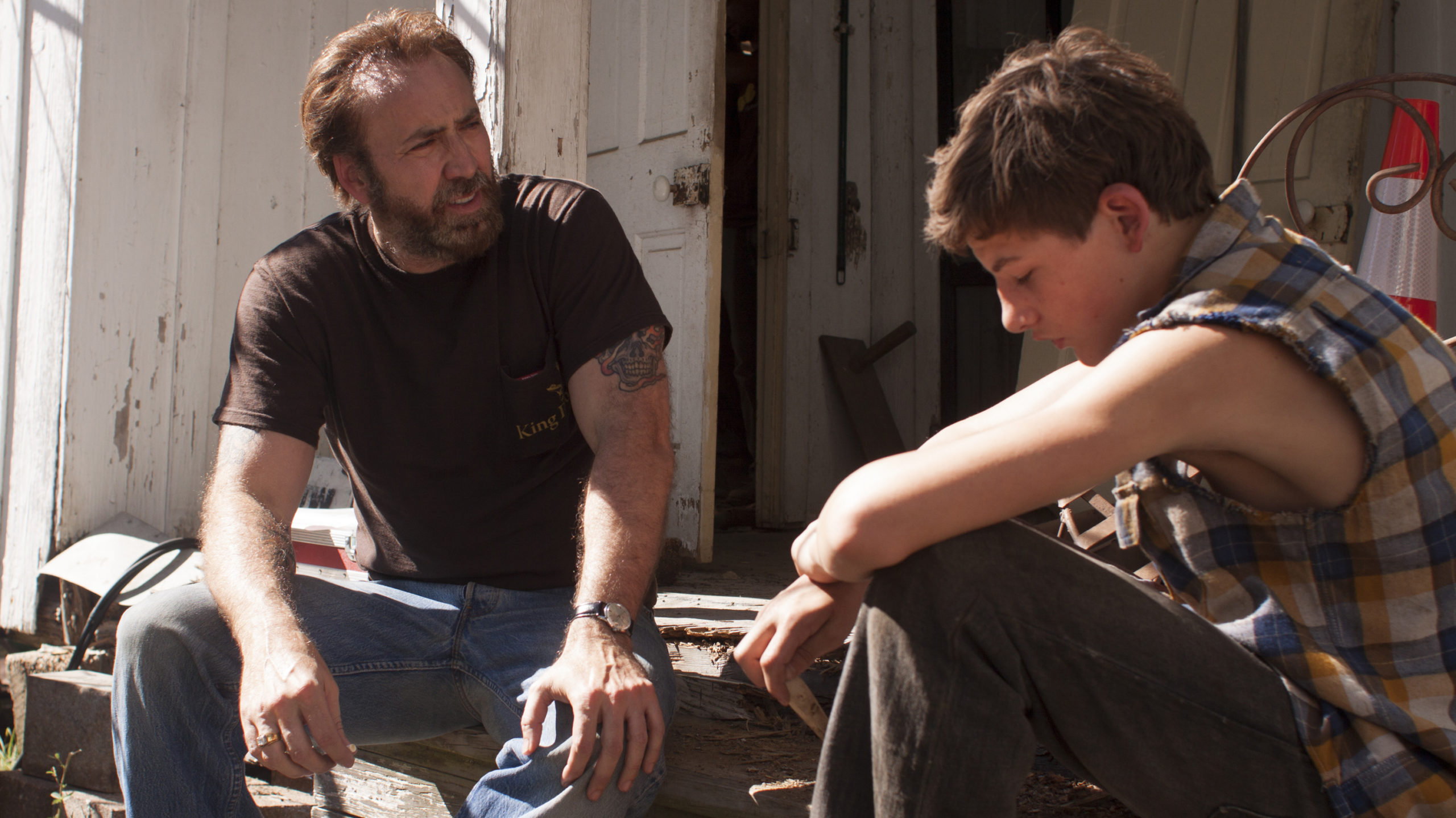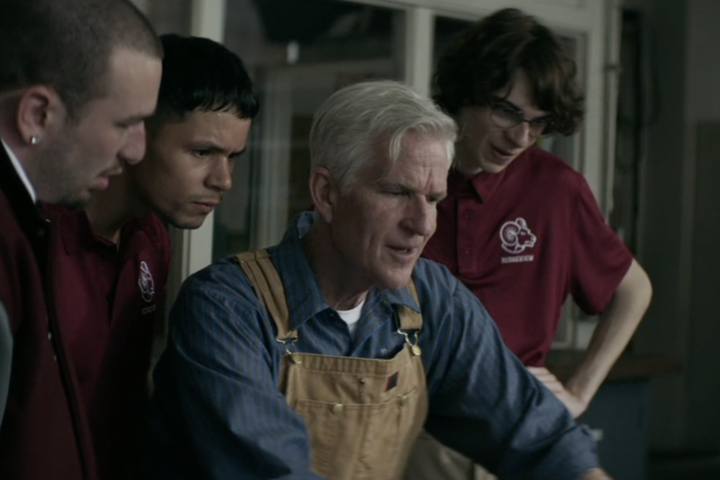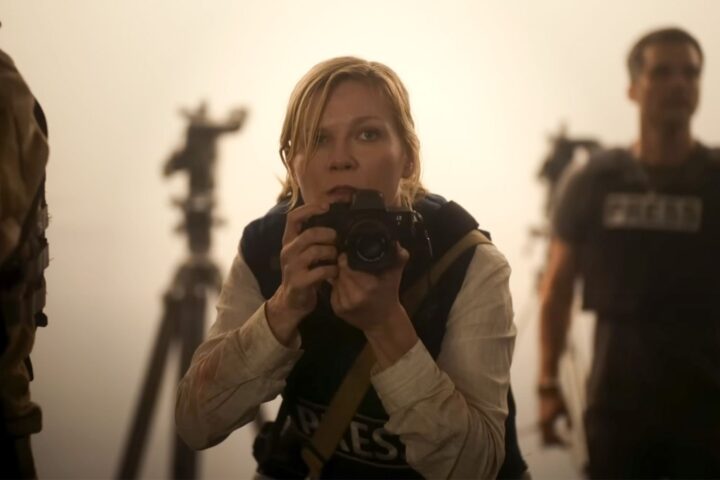In three films—Tree of Life, Mud and now Joe—seventeen-year-old actor Tye Sheridan has carved out a niche as a rural teen that experiences lost innocence and disillusionment about the world by close examinations of his adult role models. Remarkably sensitive and without posture, Sheridan comes of age in David Gordon Green’s Joe, the story of a homeless Southern teen who develops an unlikely relationship with an ex-con with his own troubles, superbly played by Nicolas Cage in a return to dramatic acting.
Green so effectively renders the small town, southern setting, a close-up look at a hermetically sealed community of hardworking folks making a day’s wage, hard drinking ex-cons who know better, in spite of themselves, and a disadvantaged youth just looking for someone to give him a shot.
I recently caught up with director David Gordon Green and star Tye Sheridan to chat about Larry Brown’s celebrated novel Joe, Sheridan’s budding career and his co-star Cage, and their authentic southern Gothic about a boy fighting the odds to become a responsible young adult.
Joe features two fascinating characters at different points in their lives. We wonder whether one could eventually become the other.
David Gordon Green: In the beginning, we tried to structure it like it was a flashback. I wanted to take some leaps editorially and structure it in a way that they have this spiritual connection. And the as they get to know each other, I think that Joe does see himself in this young man, and recognizes the very thin line he is walking on. Joe sees that he doesn’t have a good domestic situation and he says, “This kid needs a dad, and I am going to be there to help him navigate it.” That is where the conflict starts to rub—when to open the door and get out of the car, and when to not get your hands dirty in every little thing.
David, you’d been an admirer of Larry Brown’s novel, Joe, for quite some time prior to making this film.
I was a production assistant on the The Rough South of Larry Brown, directed by Gary Hawkins, my college professor. I got to know Larry and then his work, and was inspired by a guy that came from a non-traditional background and later in life tried to design a creative career for himself. Being a guy from Texas that didn’t know anybody in the movie industry or what my ticket in would be, it was great to hear somebody say “There are no rules, and anyone who tells you there are, tell them to go fuck themselves.”—his advice, and he succeeded. So I had read the novel around that time and thought it was a really cinematic novel. Every time I read books, I picture the movie, and I was picturing Robert Mitchum, in that I needed someone who would have this embodiment of physicality, curiously funny and also with dramatic intensity. So after Larry Brown passed away, Gary said “Hey, I did an adaptation of Joe on my own. Would you like to read it?” He sent it to me and I loved it, fell in love with the characters, loved Gary’s adaptation and what he had done with Joe. Joe was a very personal novel to Larry, and he based it on a lot of what he knew. There actually was a real Joe somewhere. When I read it, it felt like there was such a sadness or sensitive quality to even the most demonic of characters. As a reader or viewer, I find myself drawn into those conflicts, where even the most heinous monsters have a connection to some reality and if they could just clean themselves up or make a smart decision for once… Even Joe, a very questionable character in a lot of ways, has his own sense of ethics in place. I was drawn to these extremes of men struggling with themselves, who they are and what they want. It could be that they live for a drink. Or that they give their lives for someone else. All of these epic and intimate themes hit home with me.
Dealing with difficult subject matter is something I need to do with a sense of humor. I don’t mean that disrespectfully to the subject matter, but I do think that I have got to find- if I am going to have a character bludgeon another human being, I want to know that there is a threat of humanity in him somewhere, and I need to see him poppin’ and lockin’ and breakdancing a bit, and talking with his son. I need to see the humor. So I cast people in certain roles that were not traditionally trained actors, but had this great… Gary Poulter was this breakdancer on the streets of Austin, but someone who was funny, charismatic and had a very tough life. He is kind of a drifter, but he has humanity. You can embrace that humanity and have a sense of humor or lightness. We had to have some improvisation between Nic and Tye, like when Joe is talking about flicking the lighter and getting the hookers excited. All of that is made up so that we can, in a healthy way, then go to the dangerous and dark places.
Tye, in three major films you have portrayed a young man who experiences a loss of innocence, and I can pinpoint the scenes in the movies. For example, in Tree of Life, there is a scene where you are sitting in a field crying because you know something has happened with your father. In Mud, you have a powerful confrontation scene with Matthew. As a young man, how do you feel about that theme, either in the movies or in your life?
TS: I have always wanted to play characters that I was the same age as, because I feel like there are certain qualities that you have as a young boy that once you outgrow them, you do not have them anymore. One of my biggest pet peeves is seeing twenty-five-year-olds play high school kids. One of my biggest ever! I would go up for these roles and never get them, because it was always the good-looking, muscular kid getting cast. It pissed me off! Sometimes they don’t even do that well in those roles. As a kid, I could see it was not honest. But I feel like there is a boyish curiosity that cannot be faked.
Do you still have that?
TS: Hmm, I don’t know!
DGG: Yeah, you still got it! Hanging on by a thread!
You are from the country, in rural Texas. You mentioned once that your family likes to see you in these types of roles.
TS: I’d like to do a lot of things. But rural dramas is the only thing I was getting cast in for awhile because that was the world that I grew up in and the characters that people trusted me to play. But as I am getting older and developing into an adult, you change a lot. Your accent changes as you go to different cities. You lose that southern twang and people start taking you more seriously. All of my friends are like, “You talk so different now! You don’t have your accent anymore.”
Did you feel shades of Ellis in Gary?
TS: I mentioned that boyish curiosity, but I think both of them have curiosities that are different. Ellis is curious about love and how it works and if it actually exists. The character in Joe is looking for guidance and the question of what is right and what is wrong. That’s the cool part of my job, is getting to take something that is not yours and incorporate part of your personality into it. It is going to be hard to let go of those boyish roles; those that have a young energy to them are mainly what I am drawn too. I am becoming more interested in writing and maybe directing someday. But even when I write, the protagonist is always sixteen or seventeen.
David, Nicolas and Tye both turn in very internal performances here. They are not showy, and there have to be considerable challenges to conveying such deep feelings in minimalism.
DGG: It’s very difficult, because when you get a camera on someone and shoot a close-up, you don’t want it to be boring or look like they are lethargic or uninterested. So all of the engineering is internal. And that doesn’t make it any less visceral, but it means it is going to be more contained. So I always love it, and it is just a different set of tools and challenges. Rather than getting someone to outwardly express themselves, you are getting them to swallow words and feel those thoughts. I do three types of directing. We run the script, then we throw it away and improvise, trying different things—comedically and dramatically. And then I do a take with no dialogue and hit the same marks, feel it in your head, think the same thing, make the same eye contact. Terrence Malick produced a movie of mine early on and he had me try these exercises, and you see how often you don’t need to say any of it. I’ve used them in my other films. You can say it with a physical gesture or look in the eye, when the redness of the eyes says everything.
In my view this was a return to dramatic acting for Nicolas Cage, who has had various incarnations of his career and here performs with such command and without any affectation or manner; he simply is the character, which we have not seen him do in awhile. It was so satisfying to see him dig and deliver this character.
DGG: We just wanted to strip it all down and make it a raw performance. He had never done a character like this before. He said, “This is the closest character to me that I have ever played. I want to trust you a hundred percent and give you what you want.” When I work with actors, I want a lot of ideas and collaboration, not just their marquee value and the baggage of a resume. But that trust was really important. There is a scene where he is talking about African wild dogs at a zoo that killed a young boy who fell in. That was a moment where we were at the bar and lighting the scene and we just started quietly rolling, and I said, “What are you thinking about, Joe?” And there was a headline that morning that up at a zoo in the Northeast, a kid had fallen over and been eaten by some wild dogs. So as he was getting into his heavy head space, just thinking about that headline he had just read in the newspaper, in his hotel room. So he was just sitting there shaking his head. It was amazing. You can’t get that with every actor and some are willing to play more than others. Nic was just game to roll up his sleeves. If we wanted it on book and shouted from the rooftops he would bring that, and if we wanted it totally quiet and lost in his throat somewhere, he would.




Great interview. Can’t wait to see the film.